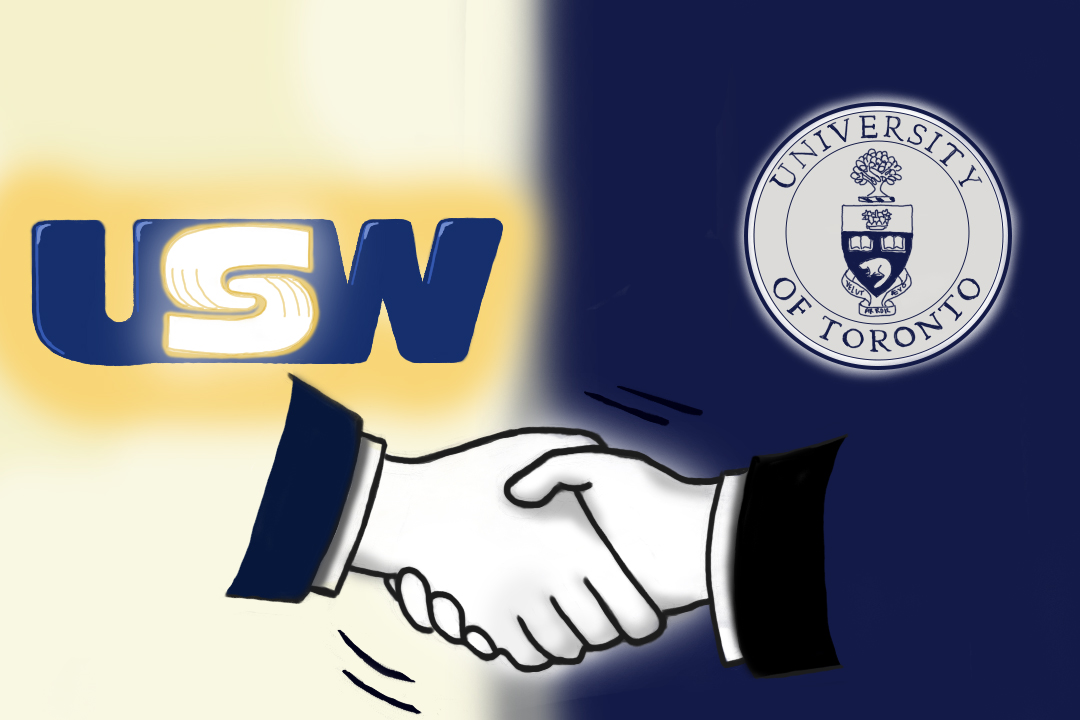On September 15, United Steelworkers (USW) Local 1998’s staff-appointed unit — which represents 5,800 permanent administrative and technical staff at UTSG, UTSC, and UTM — voted to ratify a new collective agreement with U of T. The new agreement, which operates until June 2026, includes an overall 13 per cent across the board increase in wages over the next three years. The wage increases come more than a year after a court struck down a 2019 bill from the Ontario government that had capped wage increases for public-sector employees at one per cent per year.
USW Local 1998 collectively bargains for around 10,000 administrative and technical workers across U of T, Victoria College, University of St. Michael’s College, and University of Toronto Schools; the staff-appointed unit is the largest of the union’s three units. Before the ratification, the unit voted 95.4 per cent in favour of going on strike if necessary.
Bargaining process
In 2019, the Ford government passed Ontario Bill 124, Protecting a Sustainable Public Sector for Future Generations Act, which capped wage raises for public-sector workers at one per cent per year for three years. The bill remained in effect in 2021 when the staff-appointed unit last negotiated their agreement, which provided one per cent across the board wage increases in 2021 and 2022. Meanwhile, in 2022 alone, the Canadian consumer price index — a measure of how much goods tend to cost — rose 6.8 per cent.
In November 2022, a judge struck down Bill 124, declaring it unconstitutional. However, USW Local 1998’s President John Ankenman told The Varsity that the union’s prior bargaining agreement did not include a renegotiation clause, which meant that the unit couldn’t call on the university to renegotiate wages until its agreement ended in 2023. After Bill 124 was struck down, the union submitted a letter to U of T President Meric Gertler asking to voluntarily reopen negotiations, but the university declined.
Ankenman said that this left the union “trying to do the best [it] could in this most recent round of bargaining to make up as much lost wages as [it] could.”
The staff-appointed unit’s 2023 bargaining committee — a group elected by the unit that represents its members at negotiation meetings with administration — included 14 members, with the majority working at UTSG.
The unit’s previous agreement with the university expired at the end of June. From August 29 to September 1, the unit’s membership voted on whether they would strike if the union deemed it necessary during the bargaining process, with the vast majority indicating they would. Generally, strike votes demonstrate union members’ willingness to call a strike, and votes that incur significant majorities generally result in collective agreements without the need to strike.
The bargaining committee secured a tentative agreement on September 9 and held meetings on Zoom and in person to answer members’ questions about the agreement. The union held voting online, and on September 15, members ratified the agreement.
In a memo to the U of T community, Kelly Hannah-Moffat — vice-president, people strategy, equity and culture — wrote, “I would like to thank both bargaining teams for their hard work, commitment, and professionalism throughout the process.”
The agreement
The negotiations secured a nine per cent raise across the board in 2023, a two per cent raise in 2024, and a 1.8 per cent raise in 2025.
The new collective agreement also protects members from disciplinary action if they raise concerns about their workload. Ankenman told The Varsity that he is not aware of the university taking any disciplinary measures against members for talking about issues with their workload, but said that it was “not uncommon” for union members to worry about their managers perceiving them negatively if they raised concerns.
The USW Local 1998 also negotiated a new process where members can request alternative work arrangements — such as flexible hours, a compressed work week, remote work settings, or altered work hours — on a person-to-person basis. It also requires the university to include its rationale for approving a request with adjustments or denying a request in a written response to the employee. Ankenman said that, before the current agreement, management tended to implement a one-size-fits-all arrangement to these requests without considering “the individual duties of a particular job in comparison to another job in the same department.”
Ankenman said he hopes that other unions at the university “can take what we’ve achieved and build on it for their own successes.”



No comments to display.